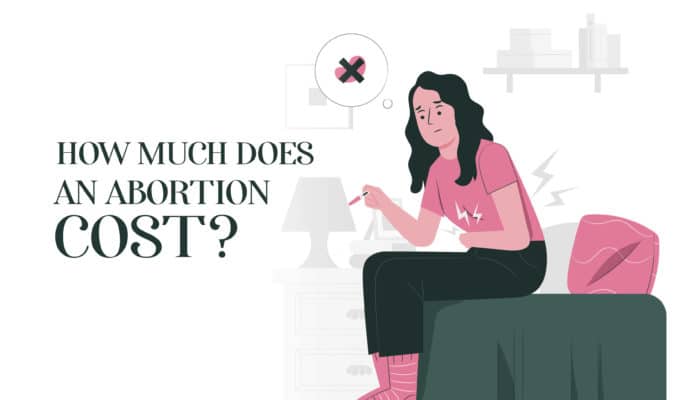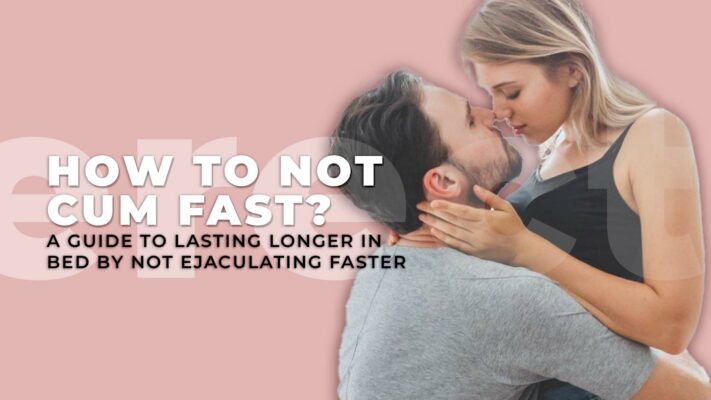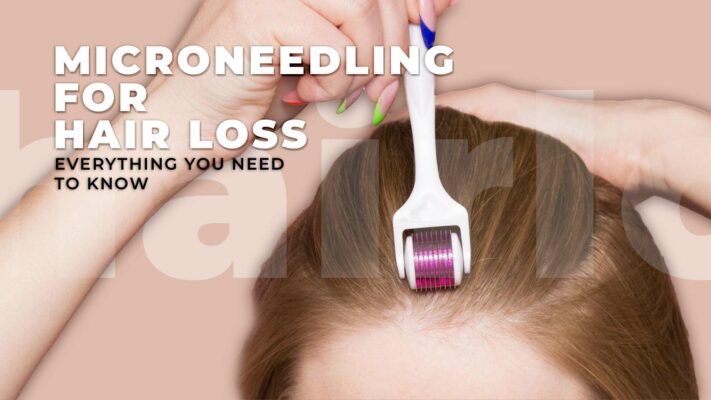How to Shorten the Refractory Period in Men
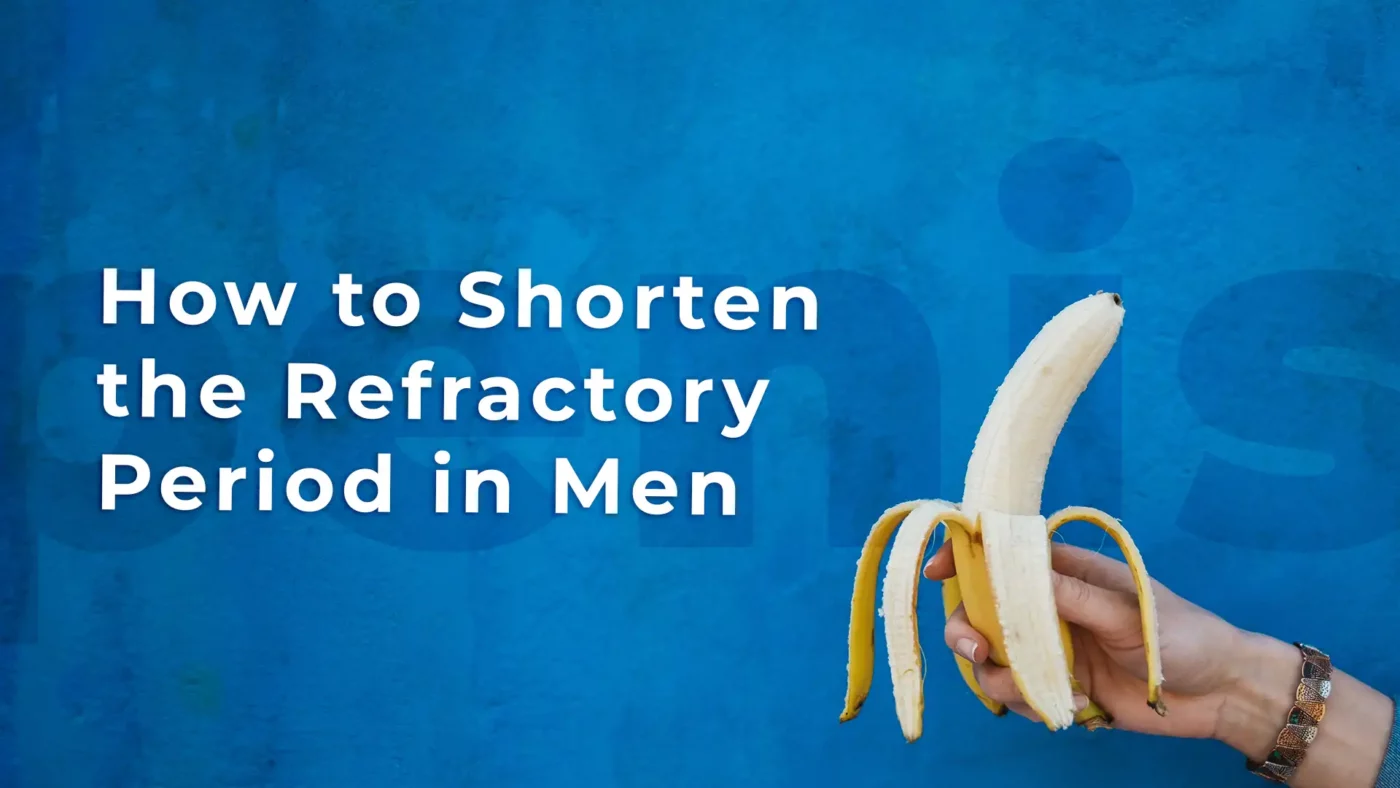
Key Takeaways:
- The refractory period is a natural phase of your sexual cycle. Your body needs to recharge after the dopamine-charged orgasmic burst after sex.
- The average duration depends on many factors, e.g., age, sex drive, and overall health.
- Younger men have a shorter refractory period. Older men have a longer one due to lower vascular supply to the penis.
- The length of time is usually shorter with masturbation than with intercourse.
- You may not be able to get rid of it. But there are ways to shorten the refractory period and boost your sexual performance.
Men often want to bring their A-game between the sheets to satisfy their partner. It is a thrilling idea to have several back-to-back sessions in the bedroom. But the penis becomes flaccid after an orgasm, making it hard to get another one.
After you reach climax, the cavernosal smooth muscle within the penis contracts. This narrows the arteries enough to let the blood flow out. It’s difficult to stay erect or be sexually aroused again after cumming. But why does it happen? Because your body needs a “refractory period” to prepare for round 2.
If you are wondering, “Why can’t I get hard again after sex?” or “Is it normal to lose erection after sex?”, you’re not alone.
You can’t expect to get hard after orgasm right away. But it is possible to reduce the interval period to regain a strong erection soon.
In this article, we explain what refractory time is. We look at the reasons why it occurs and explore science-backed methods to shorten the refractory period.
Table of Contents
What is the Refractory Period?
A lack of sexual desire or trouble getting an erection after orgasm is perfectly normal. Research shows that the “majority of males” feel exhausted and can’t have an erection right after climax.
This happens in both males and females. Women need a shorter recovery phase, or none at all, to feel aroused again.
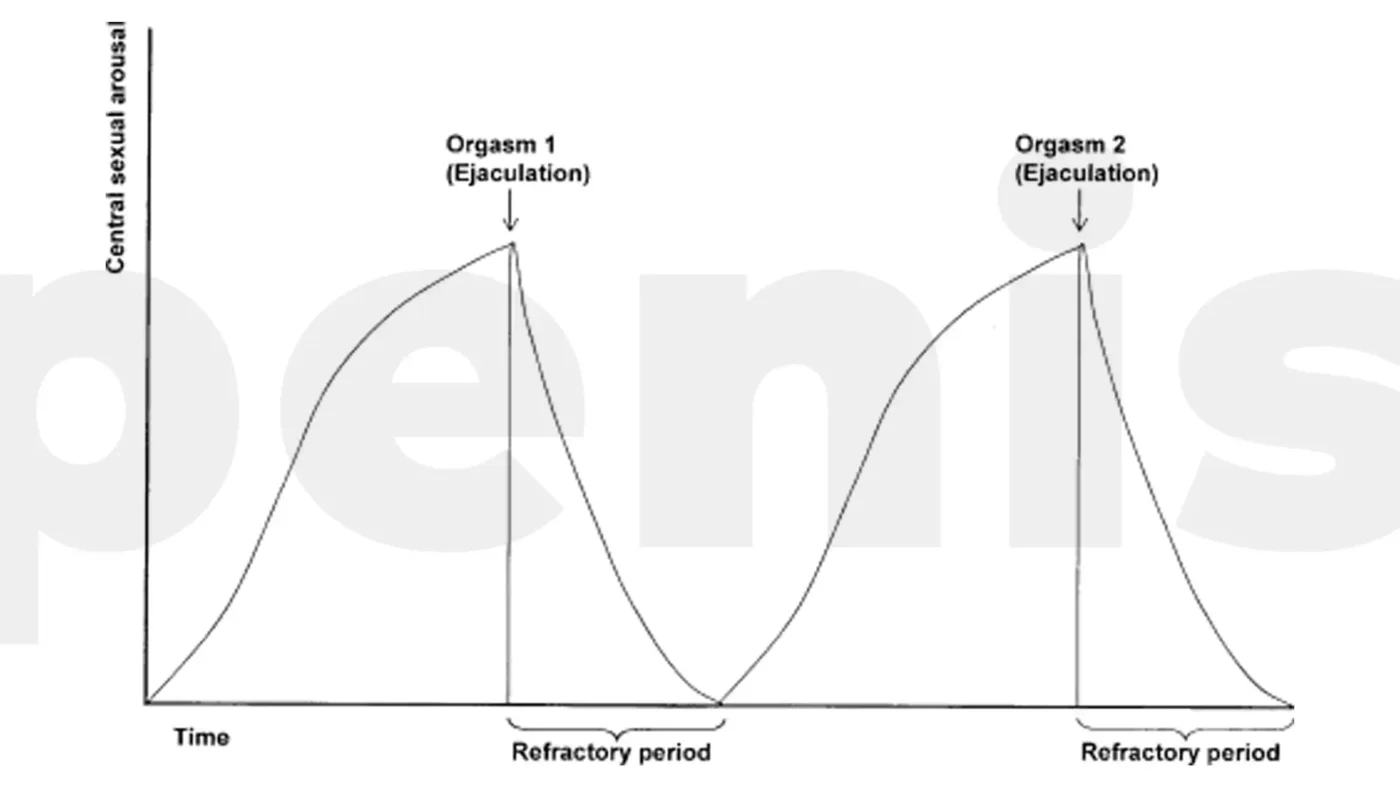
Source: The Journal of Sexual Medicine
There are four stages of how your body responds to sexual stimulation:
- Sexual Desire
You will experience an increased heart rate and enhanced blood flow to the erectile tissues.
- Sexual Arousal
The rate of heartbeat rises further, along with rising blood pressure and heavy breathing. Tension in the penile muscles increases.
- Climax
Your sexual stimulation intensifies. The heart rate and blood pressure hit a peak, and you ejaculate (release semen).
- Resolution
As the sexual excitement subsides, the erection is reversed. During the refractory phase, the body comes back to its pre-sex state. Your heart rate will normalize, and your penis will no longer be erect.
At the resolution stage, you reach the “post-orgasm refractory period”. Clinicians also refer to it as “post-ejaculatory interval”.
What Causes The Refractory Period After Sex?
We still don’t know the exact mechanism behind the refractory period. However, there’s a theory that the release of certain hormones during sex might play a role.
During an orgasm, there’s a huge increase in dopamine level (the “feel good” hormone) in the brain. After the release of semen, the level quickly drops to normal. Instead, prolactin, another hormone, spikes after orgasm.
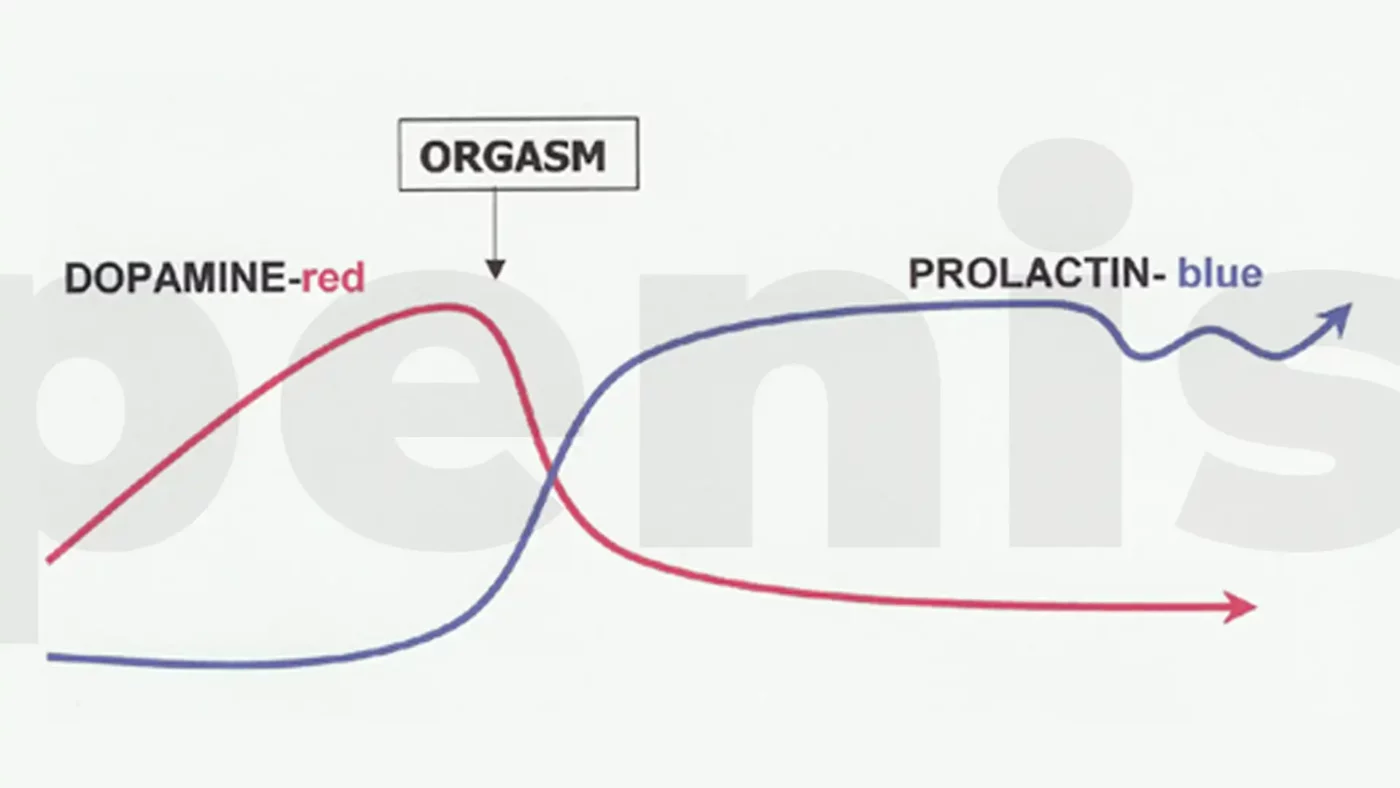
It produces a feeling of “satiety”. So you feel so happy, satisfied, and fulfilled that you lose interest in sex. Prolactin is a dopamine inhibitor. By inhibiting dopamine, it may decrease libido or sex drive.
So, it boils down to:
more prolactin = less dopamine = low sex drive, feelings of satisfaction = reduced sexual responsiveness
After sexual intercourse, prolactin level remains high for at least 1 hour. And it may continue to be released after orgasm for days and even weeks!
Another theory is that some other hormones and neurotransmitters, such as oxytocin or serotonin, may be responsible for this recovery phase. Studies reveal that the higher the oxytocin and prolactin levels, the longer the refractory period.
After orgasm, there’s also a dip in the level of testosterone. Testosterone plays an important role in controlling pelvic floor muscles and ejaculatory reflexes.
These substances control the sexual arousal pathways. They are vital to sexual excitation and inhibition.
However, we need more data to confirm that these are the causes. So, we are still determining why it happens. However, we have observed that several factors affect the length of this interval.
What Are The Factors That Affect The Refractory Period?
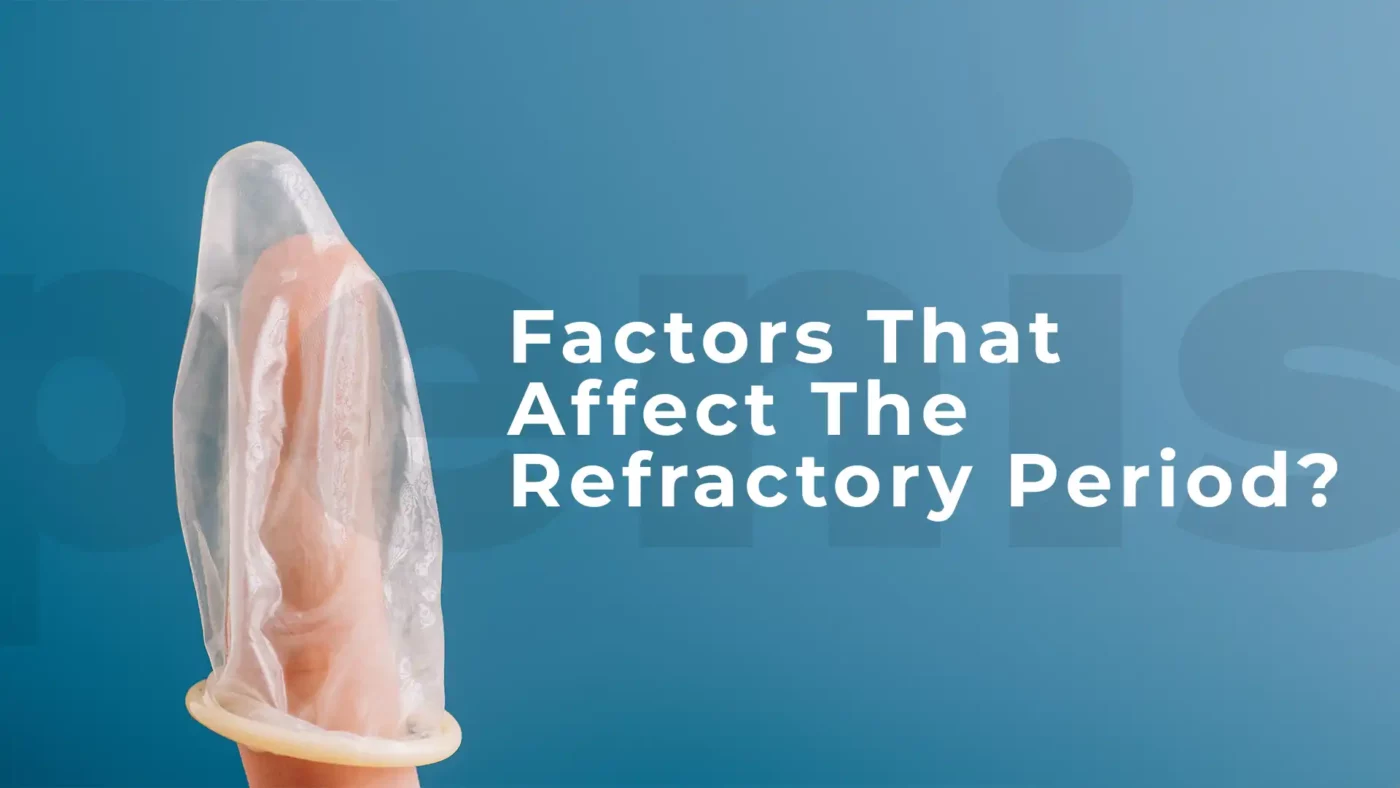
The refractory period varies from person to person and may last from a few minutes to several hours or even days.
Aging
The refractory period for a 30- or 40-year-old male who is otherwise healthy would be around 30-60 minutes. Men in their 60s or 70s may take about one day after orgasm to be capable of another one. As men get older, there’s less blood supply to the penis, so it may take longer to get another erection.
Sexual Health
Men who have sexual dysfunctions, e.g., erectile dysfunction, may have a longer post-orgasm interval. With ED, it is already difficult to get or maintain an erection for penetrative sex. To regain an erection right after sex or to have multiple orgasms becomes harder.
Libido
Some people naturally have a high sex drive (libido). This may lower their refractory period. They might be more interested in getting ready for a second round (or third).
Type of Sexual Activity
The refractory period after masturbation may be shorter than after having sex with a partner.
A study shows that the increase in prolactin after penile-vaginal intercourse was 400% more than masturbation. Prolactin is often linked with the delay in sexual function recovery after orgasm.
Overall Health
Some medical conditions, e.g., heart problems, diabetes, or obesity, can clog your arteries and affect your sexual function. This can increase the time you take to recover after a climax. Mental health, e.g., stress, depression, or high sexual expectations, can also affect arousal.
Remember that sexual arousal (the key to getting repeated erections) is not the same for everyone. It involves neural functions, such as sensory and cognitive processing, so it requires a mind-body connection. Genetic factors can influence arousal and excitement, which can also vary due to cultural, religious, and other differences.
Is There a Way to Shorten Refractory Period After Ejaculation?
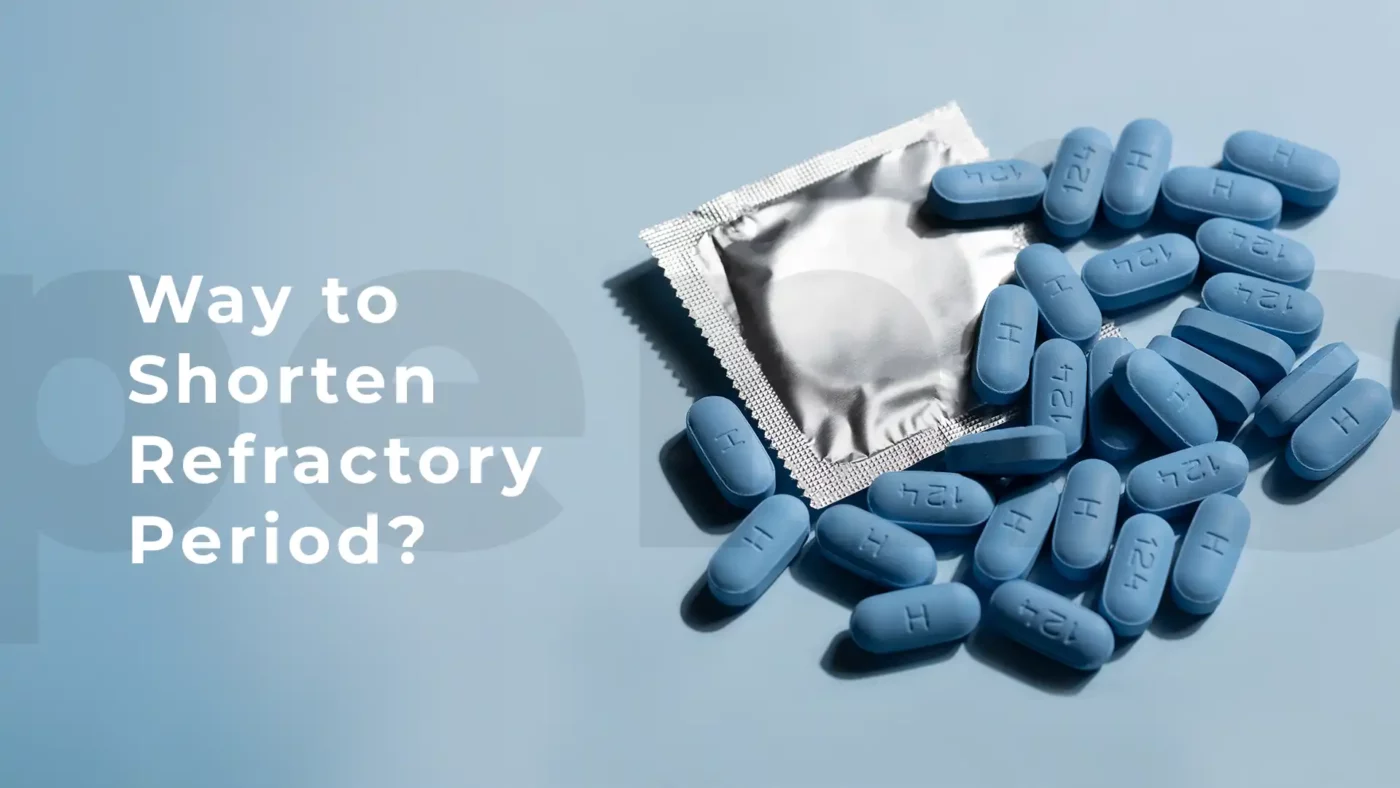
In short, yes. There are certain medical, herbal, and natural ways to reduce the interval period post-orgasm.
Medications
Does Viagra or Cialis keep you hard after ejaculation? No. But they can reduce the refractory period. Studies confirm that common erectile dysfunction medications, e.g., sildenafil, tadalafil, vardenafil, and avanafil, may help with this.
A study published in the International Journal of Impotence Research confirms this. It shows that sildenafil citrate (sold as Viagra) can reduce refractory time.
ED drugs such as Cialis or Viagra are PDE5 inhibitors. They work by inhibiting the PDE5 enzyme and thus increasing blood flow to the penis. Cialis 40 mg contains tadalafil as its active ingredient, lasting up to 36 hours. For a shorter duration of effects (4-6 hours), Viagra 50 mg or Levitra 40 mg work well.
However, consult with a doctor to make sure you take the pills safely and in the correct dosages.
Lifestyle Improvement
Exercising regularly and consuming a well-balanced diet may boost your overall sexual performance. Pelvic floor strengthening exercises (e.g., Kegels) can help you gain better control over sexual functions.
To improve your cardiovascular health, try circulation-boosting activities, such as brisk walking every day. Healthy lifestyle changes may also improve your overall sexual health.
If you have erection problems due to mental health issues, e.g., stress, performance anxiety, or low self-esteem, cognitive behavioral therapy (CBT) can help.
An honest, open communication with your partner can relieve some stress, which may positively impact your ability to perform in the bedroom.
Alternative practices, such as meditation, yoga, and breathing exercises, can also manage mental or emotional concerns. A study shows that even 12 weeks of yoga can provide sexual benefits.
Foods to Shorten Refractory Period
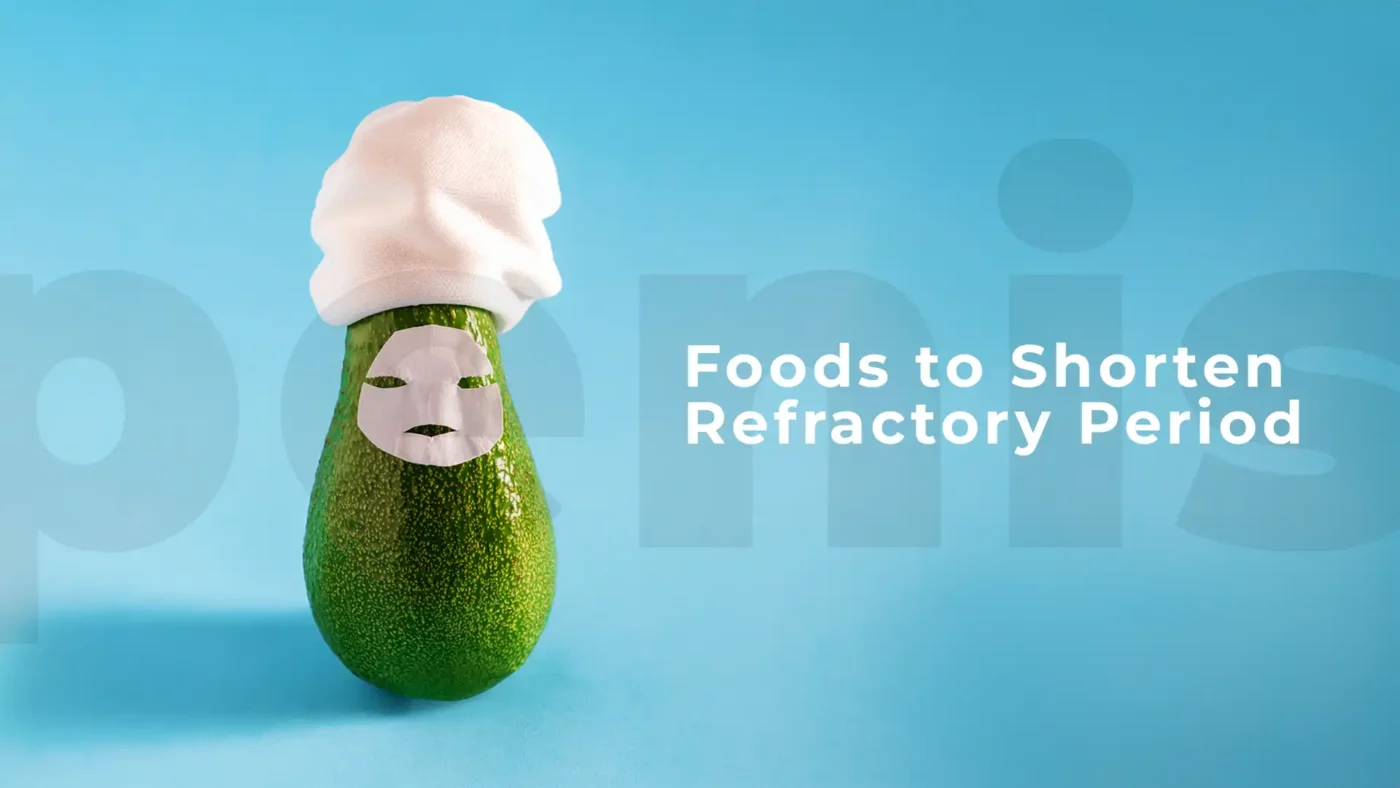
Natural foods rich in essential nutrients may help you last longer in bed by boosting blood flow to the penis. Try including some of these libido-boosting foods into your diet from time to time:
- Avocado
- Coffee
- Pomegranates
- Strawberries
- Oysters
- Fish like tuna and salmon
- Nuts
- Olive oil
- Pumpkin seeds
- Watermelon
- Beans
- Lean meat and poultry
- Chocolate
- Greens, e.g., spinach
Reduce salty, sugary, or processed food intake. Limit alcohol consumption and stop smoking.
Some of these foods are believed to work as “natural aphrodisiacs.” However, there’s no scientific proof that they can directly shorten the refractory period. In any case, a balanced diet can improve sexual performance, stamina, and libido.
Herbs to Naturally Shorten Refractory Period
The Internet is flooded with herbal supplements and “natural alternatives” to enhance your sex life. Use caution before using them. We don’t have robust clinical evidence supporting their role in improving sexual functions.
Some herbs and supplements may help with improving erectile functions, sexual arousal, and desire.
- L-arginine
- DHEA
- Maca root
- Red ginseng
- Ginkgo biloba
- Ashwagandha
However, certain herbal treatment options and supplements are not suitable for everyone. For example, DHEA cannot be used by people with existing hormone-related problems. Speak to your physician before taking any herbs, “natural remedies,” or supplements.
Other Techniques to Enhance Sexual Stimulation
Working on improving sexual arousal techniques helps you to get an erection sooner after orgasm.
- Foreplay may enhance the effects of the actual act. Search for new sex positions and try them out after finishing once.
- You can also spice up your game by pursuing role-play and trying new fantasies.
- Uplifting your ambiance by lighting up a few aromatic candles may get you into the mood.
- Try moving out of your bedroom and get it going in new places to get excitement.
If you have erection problems regularly, there might be an underlying condition, e.g., diabetes or cardiovascular issues. The condition must be managed and treated to optimize your erectile function.
Final Thoughts
Orgasm is important to release the neuromuscular tension that builds up during sexual stimulation. The refractory period gives your body the time to recover and regain another erection. After intense thrill, intimacy, and sexual excitement, it allows your body to take a break. Use these tips to have better erectile strength and reduce your refractory period. This will help you “rise” to the occasion when you’re in the mood!
FAQs
References
- Shih, C. M., Huang, Y. J., Lai, J. C. M., & Hsieh, M. Y. (2023). Exploring Research on Elevating Male’s Multiple Sexual Climaxes. https://doi.org/10.3390/engproc2023038031
- Levin, R. J. (2009). Revisiting Post-Ejaculation Refractory Time—What we know and what we do not know in males and in females. The Journal of Sexual Medicine, 6(9), 2376–2389. https://doi.org/10.1111/j.1743-6109.2009.01350.x
- Castro, G. (2014, November 18). Postcoital Neurochemistry: The Blues and the Highs – Emotion, Brain, & Behavior Laboratory. https://sites.tufts.edu/emotiononthebrain/2014/11/18/postcoital-neurochemistry-the-blues-and-the-highs
- Brody, S., & Krüger, T. H. (2006). The post-orgasmic prolactin increase following intercourse is greater than following masturbation and suggests greater satiety. Biological Psychology, 71(3), 312–315. https://doi.org/10.1016/j.biopsycho.2005.06.008
- McIntosh, T. K., & Barfield, R. J. (1984). Brain monoaminergic control of male reproductive behavior. I. Serotonin and the post-ejaculatory refractory period. Behavioural Brain Research, 12(3), 255–265. https://doi.org/10.1016/0166-4328(84)90151-7
- [Oxytocin and male sexual function]. (2011, June 1). PubMed. https://pubmed.ncbi.nlm.nih.gov/21735659/
- Alwaal, A., Breyer, B. N., & Lue, T. F. (2015). Normal male sexual function: emphasis on orgasm and ejaculation. Fertility and Sterility, 104(5), 1051–1060. https://doi.org/10.1016/j.fertnstert.2015.08.033
- Gareri, P., Castagna, A., Francomano, D., Cerminara, G., & De Fazio, P. (2014). Erectile Dysfunction in the Elderly: An Old Widespread Issue with Novel Treatment Perspectives. International Journal of Endocrinology, 2014, 1–15. https://doi.org/10.1155/2014/878670
- Gareri, P., Castagna, A., Francomano, D., Cerminara, G., & De Fazio, P. (2014b). Erectile Dysfunction in the Elderly: An Old Widespread Issue with Novel Treatment Perspectives. International Journal of Endocrinology, 2014, 1–15. https://doi.org/10.1155/2014/878670
- Lippa, R. A. (2006). Is high sex drive associated with increased sexual attraction to both sexes? Psychological Science, 17(1), 46–52. https://doi.org/10.1111/j.1467-9280.2005.01663.x
- Lippa, R. A. (2006b). Is high sex drive associated with increased sexual attraction to both sexes? Psychological Science, 17(1), 46–52. https://doi.org/10.1111/j.1467-9280.2005.01663.x
- Brody, S., & Krüger, T. H. (2006). The post-orgasmic prolactin increase following intercourse is greater than following masturbation and suggests greater satiety. Biological Psychology, 71(3), 312–315. https://doi.org/10.1016/j.biopsycho.2005.06.008
- Bates, J. N., Pastuszak, A. W., & Khera, M. (2019, March 1). Effect of body weight on sexual function in men and women. PubMed Central (PMC). https://www.ncbi.nlm.nih.gov/pmc/articles/PMC6771291/
- Bates, J. N., Pastuszak, A. W., & Khera, M. (2019b, March 1). Effect of body weight on sexual function in men and women. PubMed Central (PMC). https://www.ncbi.nlm.nih.gov/pmc/articles/PMC6771291/
- Schober, J. M., & Pfaff, D. (2007). The neurophysiology of sexual arousal. Best Practice & Research Clinical Endocrinology & Metabolism, 21(3), 445–461. https://doi.org/10.1016/j.beem.2007.04.006
- Mondaini, N., Ponchietti, R., Muir, G. H., Montorsi, F., Di Loro, F., Lombardi, G., & Rizzo, M. (2003b). Sildenafil does not improve sexual function in men without erectile dysfunction but does reduce the postorgasmic refractory time. International Journal of Impotence Research, 15(3), 225–228. https://doi.org/10.1038/sj.ijir.3901005
- Almuqahwi, A., Alabdrabulridha, H., Aljumaiah, R. M., Alfaifi, A. J., Alnaim, M. F., Alfaifi, I. A., Alsaleh, N. A., Alsalem, N. A., Alsuwaylih, F., Almana, A. a. A., Altaweel, F. I., Alsalman, S. M., & AlAli, Y. (2023). A systematic review on the relationship between physical activity and sexual function in adults. Cureus. https://doi.org/10.7759/cureus.51307
- Bhat, S., Pandey, M. K., K, U., Gokani, N., & Rao, T. S. (2024). A scoping review: Is yoga an effective intervention for erectile dysfunction and premature ejaculation? Cureus. https://doi.org/10.7759/cureus.53265
Disclaimer
HisBlue is not a substitute for professional medical care or advice from your doctor. The health information on the HisBlue website is general and provided for your information only. We have ensured our content is accurate and current, with reviews by expert doctors. However, we cannot guarantee its accuracy or timeliness. This information is not meant to replace the diagnosis, treatment, or judgement of your doctor or another qualified healthcare provider.


